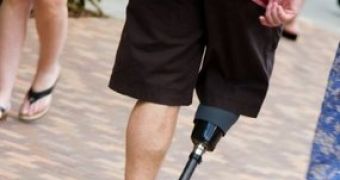I for one cannot imagine life without a hand or a leg for that matter, although there are some people who feel that parts of their bodies are somehow in the way and are tormented by the fact that their bodies have two hands for example, instead of one as their instinct says they should have. Most of them end up self amputating one or two of their limbs and report finally feeling that their body is just the way they feel it should be.
Researchers call this the Body Integrity Identity Disorder, a rare condition that basically contradicts everything we know about animal and human instincts. Individuals suffering from BIID usually keep their condition secret from the members of their families and the community they live in, making up stories about how they lost a limb in a freaky accident, when in fact the event was anything but that.
In the last decade, BIID communities started to form over the Internet in the hope that society would accept the fact that they are suffering from a serious disorder. And by doing so, they might have just gained some support from the scientific community, which believes that the condition is related to similar disorders such as anorexia, the body dysmorphic disorder and gender identity disorder, which may appear at first as psychological matters, but could be in fact related to physical differences in the brain.
"In studying the hinterland between neurology and psychology, we can tell not just about people with conditions themselves, but how all our brains work", says Paul McGeoch, a neurologist at the University of San Diego. McGeoch is currently doing research regarding the brains of people suffering from BIID, hopping to establish once and for all whether or not the condition is of psychological or physical origin.
People suffering from BIID, gathering daily on the Internet, say that the only way to treat their condition would be to establish the legal means for them to benefit from medically supervised amputations. According to some sources, there are about 1,500 people visiting the community of BIID sufferers every day and 1,700 people, part of another group, claim that they are trying to resist their instinctive will of amputating one of their limbs.
Interviews with some BIID sufferers reveal that the disorder manifests itself as an indescribable feeling that their body is somehow wrong, similar to the transgender disorder some people suffer from, people who are now protected by law in some countries as a result of the disorder being recognized both medically and psychologically.
"Nothing touches it, other than surgery. Psychotherapy doesn't work. Psychiatry doesn't work. Medication doesn't work. I'm a pretty typical example of someone who's attempted a [number] of ways to address the problem, done years of therapy of many types, including cognitive-behavioral therapy, and nothing helps", says Sean O'Connor, a BIID sufferer who runs two of the websites for the BIID community and says that his condition manifest itself as an urge to become paraplegic. O'Connor is now using a wheelchair, but has not found yet a way to paralyze his feet.
"Certainly, there are some who would be repulsed by the idea that someone would intentionally disable themselves. But I think they would be treated the same way anybody with a mental health problem would be treated", says Nancy Starnes, senior vice president at the National Organization on Disability, in an interview.
Columbia University professor of clinical psychiatry Dr. Michael First, who has conducted a study on a group of BIID sufferers nearly four years ago, says that the problem is far from being of a psychological nature. "You almost have to see it to believe it. These people say, 'Every minute of my life I feel like something is wrong.' But it doesn't impair their ability to relate to other people. They are completely in touch with reality", he said.

 14 DAY TRIAL //
14 DAY TRIAL //